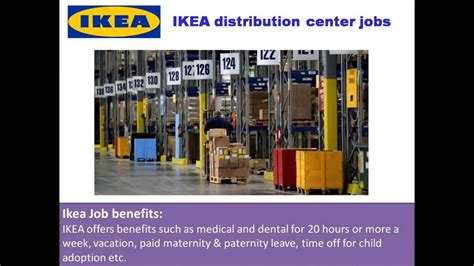Distribution Center Meaning In Jobs

The concept of a Distribution Center is integral to the world of logistics and supply chain management. In the realm of jobs and employment, a distribution center plays a pivotal role in ensuring that products and goods reach their intended destinations efficiently and effectively. Let's delve into the meaning and significance of distribution centers in the job market and explore how they impact various industries.
Understanding Distribution Centers

A distribution center, often abbreviated as DC, is a strategically located facility that serves as a hub for storing, managing, and distributing goods. It acts as an intermediary between manufacturers or suppliers and retailers or end consumers. The primary purpose of a distribution center is to optimize the flow of goods by consolidating, sorting, and dispatching products to their final destinations.
Distribution centers are designed to streamline logistics operations, reduce transportation costs, and enhance overall supply chain efficiency. They are equipped with advanced technology, automated systems, and skilled personnel to handle a wide range of products, from consumer goods to industrial equipment.
The Role of Distribution Centers in Job Creation

The establishment and operation of distribution centers have a significant impact on job creation and employment opportunities. Here’s how distribution centers contribute to the job market:
Warehouse Operations and Management
Distribution centers require a substantial workforce to manage daily operations. Jobs in warehouse management involve overseeing the receipt, storage, and dispatch of goods. These roles often include warehouse supervisors, inventory managers, and logistics coordinators who ensure that products are handled efficiently and securely.
| Warehouse Position | Key Responsibilities |
|---|---|
| Warehouse Manager | Overseeing warehouse operations, staff management, and ensuring optimal inventory levels. |
| Receiving Clerk | Processing incoming shipments, verifying quantities, and updating inventory records. |
| Order Picker | Locating and retrieving items from shelves to fulfill customer orders. |
| Packaging Technician | Preparing items for shipment, ensuring proper packaging, and adhering to quality standards. |

Transportation and Logistics
Distribution centers are interconnected with transportation networks, creating opportunities in logistics and delivery services. Jobs in this sector include truck drivers, dispatchers, and logistics planners who coordinate the movement of goods from distribution centers to various destinations.
- Truck Drivers: Responsible for transporting goods over long distances, ensuring timely deliveries, and maintaining vehicle safety.
- Logistics Planners: Optimize routes, manage transportation schedules, and coordinate with multiple distribution centers to maximize efficiency.
Supply Chain Management
The supply chain industry thrives around distribution centers. Supply chain managers, analysts, and consultants play a crucial role in optimizing the entire supply chain process, from procurement to distribution. These professionals analyze data, identify inefficiencies, and implement strategies to improve overall supply chain performance.
Information Technology (IT)
Distribution centers rely heavily on technology to streamline operations. IT professionals are in demand to develop and maintain warehouse management systems, inventory tracking software, and data analytics tools. Roles in this field include software developers, system administrators, and data analysts.
Industry-Specific Applications
Distribution centers serve various industries, each with unique requirements and challenges. Let’s explore some industry-specific applications of distribution centers and their impact on jobs:
Retail and E-commerce
Retailers and e-commerce businesses heavily depend on distribution centers to fulfill customer orders promptly. Jobs in this sector include order processing, customer service representatives, and quality control specialists who ensure accurate and timely order fulfillment.
Manufacturing and Industrial
Manufacturers utilize distribution centers to manage their supply chains efficiently. Jobs in manufacturing distribution centers often involve inventory management, product distribution, and coordinating with multiple suppliers and customers.
Food and Beverage
The food and beverage industry relies on distribution centers to ensure the timely delivery of perishable goods. Jobs in this sector include cold storage management, food safety specialists, and logistics planners who optimize temperature-controlled transportation.
Future Trends and Innovations
The distribution center industry is evolving rapidly, driven by technological advancements and changing consumer demands. Here are some future trends and innovations shaping the distribution center landscape and their potential impact on jobs:
Automation and Robotics
Automation and robotics are revolutionizing warehouse operations. Automated guided vehicles (AGVs), robotic arms, and conveyor systems are being implemented to enhance efficiency and reduce manual labor. While automation may reduce the need for certain manual jobs, it also creates opportunities for skilled technicians and engineers to maintain and operate these advanced systems.
Data Analytics and AI
Data analytics and artificial intelligence (AI) are transforming supply chain management. These technologies enable real-time inventory optimization, predictive analytics, and demand forecasting. Jobs in this field will focus on data science, machine learning, and developing algorithms to improve supply chain efficiency.
Sustainable Practices
Distribution centers are increasingly adopting sustainable practices to reduce their environmental impact. This includes implementing energy-efficient technologies, optimizing transportation routes to minimize emissions, and promoting eco-friendly packaging. Jobs in sustainability management will become more prevalent, focusing on reducing the carbon footprint of distribution operations.
FAQ

What skills are essential for working in a distribution center?
+Working in a distribution center requires a combination of skills, including organizational abilities, attention to detail, and physical stamina. Proficiency in using warehouse management systems and basic computer skills is also beneficial. Additionally, communication and teamwork skills are essential for effective collaboration with colleagues.
How do distribution centers impact local economies?
+Distribution centers contribute significantly to local economies by creating job opportunities and stimulating economic growth. They attract businesses, generate tax revenues, and support the development of infrastructure and transportation networks in the surrounding areas.
What are the challenges faced by distribution center workers?
+Distribution center workers may face challenges such as physically demanding work, long hours, and the need to adapt to changing technologies and processes. Additionally, they may encounter safety hazards and the pressure of meeting strict deadlines. Proper training, safety protocols, and support systems are essential to mitigate these challenges.

